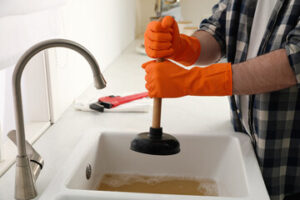Drain Cleaning Perth is a vital part of home maintenance that can help prevent major problems down the road. Many household items can clog drains and cause foul odors.
Regular drain cleaning removes waste and odor, helping your house stay smelling fresh. It can also prevent more serious issues like a clogged pipe that may cost you more money in repairs down the road.
Baking soda and vinegar can make a great combination as an eco-friendly drain cleaner. It can refresh a stinky drain and help break down clogs with minor build-up. This technique is also inexpensive and easy to use. However, it should not be used on stubborn or severe clogs. In such cases, it is best to contact a professional plumber.
Vinegar and baking soda create a chemical reaction that releases carbon dioxide bubbles. This fizzing action can dislodge food debris, hair, and other substances that clog drains. It can also dissolve some grease and mineral deposits. However, it should be noted that this method can cause damage to pipes if it is used frequently. Therefore, it should be used as a temporary solution to prevent serious drain problems.
The acidic nature of vinegar can erode certain types of pipes, particularly older ones. This is why it is important to understand the different types of clogs and their causes before using baking soda and vinegar as a drain cleaning product. Fortunately, there are several methods that can be used to clear more stubborn or severe clogs.
When baking soda and vinegar are used to clean a drain, they form a chemical reaction that creates water, sodium acetate, and carbonic acid. These chemicals can erode or crack metal pipes. In addition, they can create a large amount of pressure in the pipe, which can lead to cracks and leaks.
Baking soda can also corrode some plastic materials. Therefore, it is best to avoid mixing these two ingredients together in a kitchen sink or bathroom drain. Additionally, it is best to pour hot (ideally boiling) water down the drain before using this method. This will soften grease and soap scum, which can be more difficult to remove.
If you have a mild to moderate clog in your home, try the following methods before resorting to baking soda and vinegar. Borax and vinegar: Mix a half cup of baking soda with one cup of vinegar. Pour the mixture down the drain and let it sit for about an hour. Then, flush the drain with hot water.
Dish soap
While most of us use dish soap to remove food, grease and other residue from our dishes, it is also a useful cleaning product for clogged drains. In fact, many people have found that it is much safer and less expensive than chemical drain cleaners.
The best dish soaps are made with a combination of surfactants and enzymes that effectively break down grease. They are also gentle on hands and safe for a wide variety of surfaces. Many also contain antibacterial ingredients that prevent the growth of bacteria. Additionally, they often include a pleasant fragrance that makes dishwashing an enjoyable experience. Some are even available in ecofriendly, biodegradable packaging that reduces the waste caused by single-use plastic bottles.
Pouring a little dish soap down a drain can help to break up soap scum and hair. It can also deodorize and freshen the drain. You can even use it to clean the sink or tub if you leave it in for a few minutes. However, you should never mix dish soap with bleach or vinegar because they can create toxic fumes.
Using a mesh trap is an effective way to keep your pipes free of hair, soap scum and other debris that can contribute to clogged drains. You can purchase these from most hardware stores and they are easy to install. You can also try using a strainer to catch the debris as it is rinsed away from dishes, which will make cleaning your drains easier.
Many homeowners have been successful in preventing clogged drains by taking a few simple steps. Using a mesh drain trap is the most effective, but it is important to clean it regularly to ensure that it does not become blocked with grease or other debris. Using a drain stopper is another way to prevent clogs.
Many homeowners are looking for green ways to clean their homes, and using a little dish soap down the drain can be a great alternative to chemical cleaners. Although it may not completely unclog a drain, it can break down fats and oils that build up in your pipes and cause blockages.
Chemical cleaners
Chemical drain cleaners are pure or mixtures of chemicals designed to dissolve buildup in your drain. They can be found in hardware stores and are typically sold as liquid drain cleaners or gels. Most of them work by creating a chemical reaction with the substances that comprise your clog, most of which are organic materials such as hair, food waste or grease. These cleaners often release fumes that can be harmful to your skin, eyes or mucous membranes. They can also cause respiratory issues if inhaled for long periods of time. You can avoid these dangers by using exhaust fans or opening windows while they are in use, as well as wearing a face mask, goggles and rubber gloves.
Most liquid chemical drain cleaners require you to leave them in your clogged pipe to take effect. They may take up to 15 minutes to work. Some of them also specify that you must flush out your pipes with water afterward to remove any residue. These products are designed to tackle only small clogs, and they won’t break up or dislodge blockages that are further down in your pipes or sewer line.
Many of these chemical cleaners come with a warning that they are dangerous to people and pets. They can cause chemical and thermal burns if they contact your skin or mucous membranes. They can be toxic if ingested and are unsafe to store around children and pets. Additionally, they may corrode your pipes and cause extensive damage that requires expensive plumbing repairs.
While chemical cleaners can be effective at removing small clogs, they aren’t always the best option. They can be harmful to your pipes and the environment, and they don’t always clear all types of clogs. In addition, they can destroy the beneficial bacteria in your septic tank, leading to further problems down the line. Regular maintenance, avoiding disposing of grease and large food particles in the drain, and using sink strainers can help prevent clogs from occurring in the first place. A professional plumber can also offer you more reliable and durable drain cleaning solutions, including the use of a plumbing snake or hydro jetting.
Plumbing snake
Unlike chemical drain cleaners, which can be harsh on pipes, a plumbing snake uses a mechanical approach to clear clogs. It consists of a flexible coil that is manually inserted into the pipe and moved through it with the help of a handle. Once the snake reaches the clog, it can be used to break it up or entangle it. In some cases, it may be necessary to turn the snake head back and forth or up and down to dislodge stubborn clogs. It is important to exercise caution when using a plumbing snake, as it can be messy and dangerous. It is also recommended to wear rubber gloves and safety goggles. It is also important to shut off the water supply before beginning the process.
Kitchen sinks often become clogged with food scraps and grease. To prevent clogs, it is a good idea to regularly remove debris from the drain and dispose of it properly. Putting a drain stopper in the garbage disposal can also prevent large food waste items from washing down the drain.
Bathroom drains are more likely to become clogged with hair and soap scum. To prevent clogs, it’s a good idea to install drain screens in sinks and showers and regularly clean them. It is also important to avoid flushing items such as wet wipes, sanitary products, or paper towels down the toilet.
A plumbing snake can be purchased at most hardware and home improvement stores. It is also possible to make one from a wire coat hanger. A simple wire coat hanger can be fashioned into a plumbing snake by simply bending the end and attaching it to the hook at the opposite end of the pipe. A curved metal blade or a piece of wood can be attached to the end of the snake to help it penetrate the clog.
When using a plumbing snake, it is important to rotate the handle clockwise and move the coil slowly. Using too much force can damage the pipes or the snake. If the clog is too dense to advance, it may be necessary to use a broom or a plunger to break up the buildup and then attempt to clear it again with the snake. If the clog persists, it is recommended to seek professional help.
